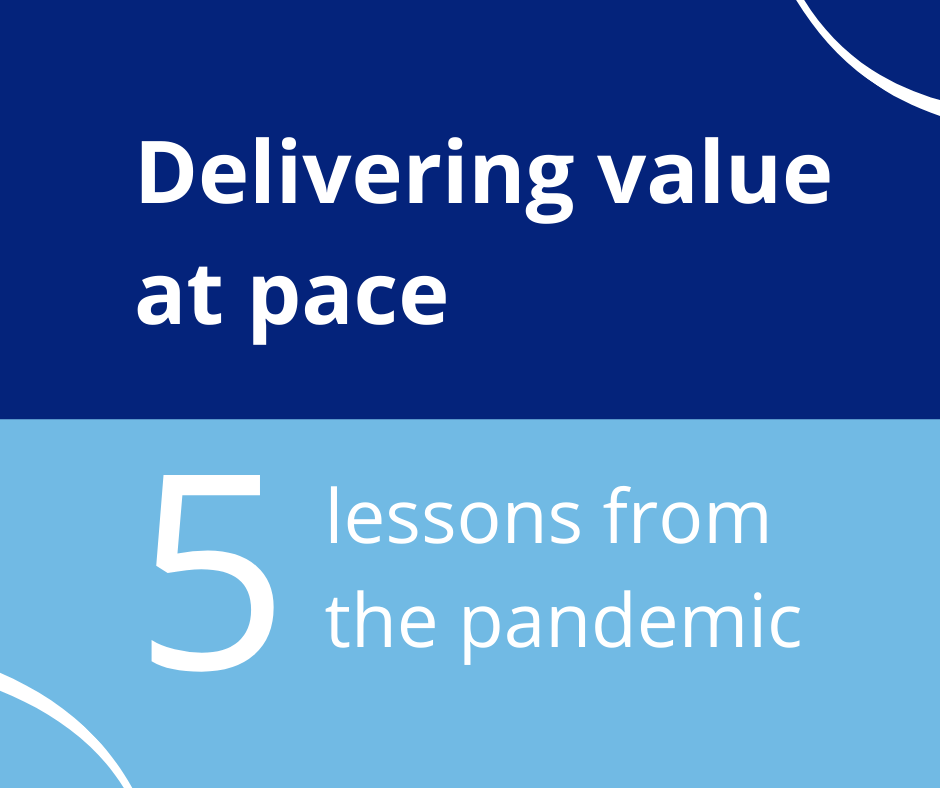Thank you to everyone who came to our recent panel discussion about how housing IT teams responded to coronavirus.
Colleagues across the sector demonstrated what was possible, completely transforming ways of working, business processes and systems in only six weeks.
Here are our thoughts on how we can all capitalise on the phenomenal achievements made last year and turn this into a model for long-term, sustainable improvement and delivery,

- Deliver value at pace: one of the lessons that came out of the coronavirus pandemic was the need to move at pace. Housing providers needed to move quickly, like never before, which meant that the usual project governance arrangements – more suited to medium and longer-term planning – were suspended in favour of a more nimble approach that focused on incremental improvements. Clearly, projects do need governance, but often the meeting cycle means that decisions can take weeks to filter down the organisation, instead of empowering colleagues to act and respond to changing circumstances.
- Innovate with the minimal viable product: the need for staff to work at home and avoid face-to-face contact with residents forced housing providers to make changes to processes in a matter of weeks. This meant that whereas before the pandemic, software and systems improvements had taken months or even years to implement, they were delivered in a few weeks.
Changes to repairs and maintenance procedures, moving to online sign-up processes and text messaging in volume are all good examples of this.
Colleagues asked themselves, what is the minimum viable product needed to solve a problem. Rather than taking months to deliver a project, they delivered key elements quickly and then returned, to improve it further, once live.
In other words, they favoured incremental improvements, as opposed to always turning change initiatives into a project. It also meant that not all decisions went to a project board, with decisions devolved down to service areas much more.
Do all decisions need to go to a project board? Or can speedier decision making processes help move things along more quickly, once the broad parameters of a project have been agreed? Or does change even need to be turned into a project?
- Trust your specialists: last year saw decision making devolved down to trusted IT specialists much more, giving them the autonomy to make changes to systems and processes.
Checks and balances were still in place, but with less bureaucracy involved.
Again it was a case of making incremental changes. Chunking areas of work up into smaller pieces of work proved helpful and avoided larger project plans which can often be unwieldy and may even be out-of-date by the time they get signed off.
A quicker decision-making process is also good for morale, as staff received feedback earlier and can see the results of their work sooner rather than later.
- Devolve financial and budget decisions: projects can often be held up by financial planning and budget setting. Obviously, budgets need to be set, but there is clearly a case for devolving this sort of decision down to a departmental level.
- Are smaller suppliers more nimble? Clearly, there are benefits to using both large and small suppliers. However, smaller suppliers tended to react more quickly to client requirements and were able to develop better solutions. Again this is a good example of where more traditional businesses can be let down by internal bureaucracy and slow decision making processes.
To find out more about how the team at Manifest can help you develop more nimble solutions to your IT needs, please get in touch with Gareth Rexworthy, our Managing and Commercial Director on 07954 602 568 or email gareth@manifestconsulting.co.uk

